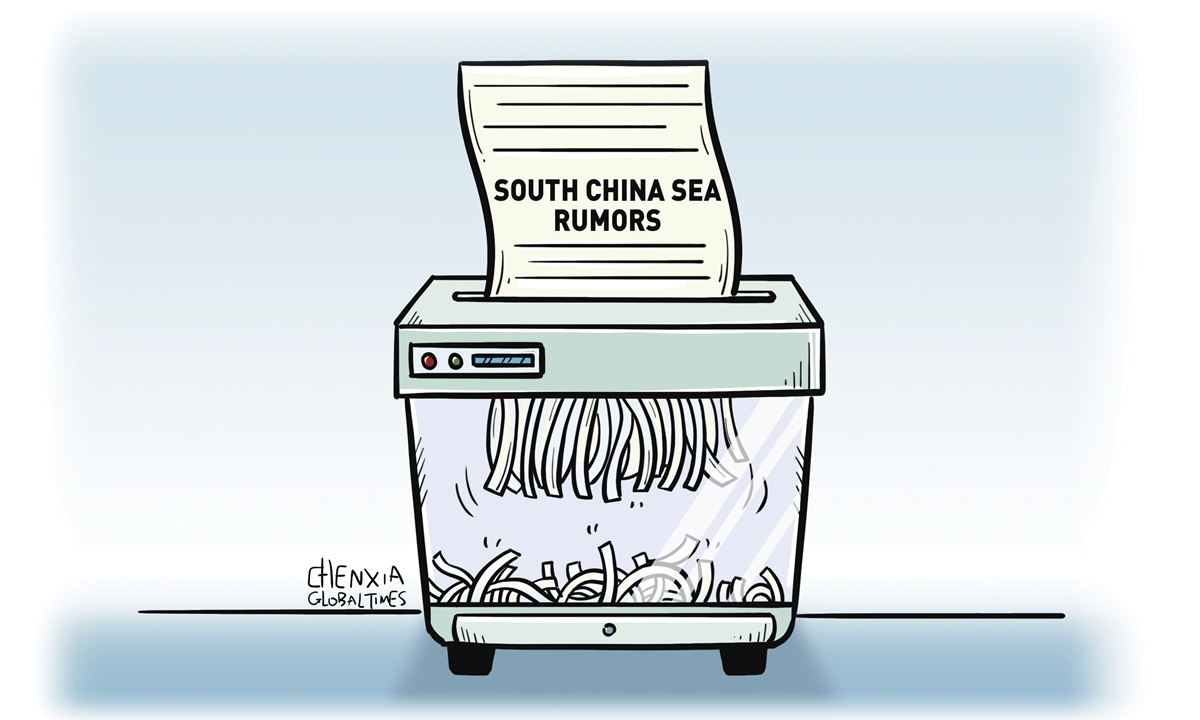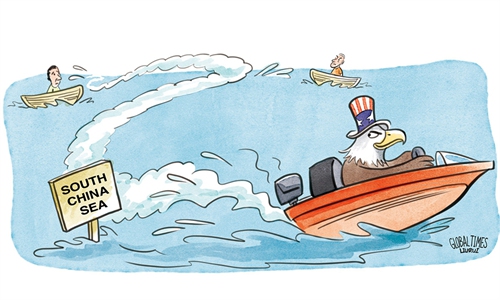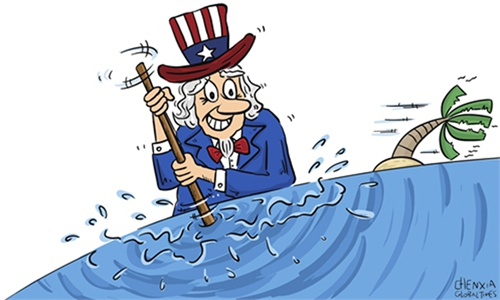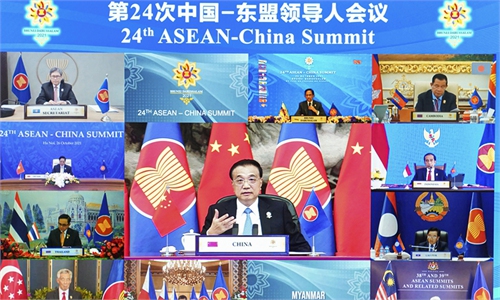
SCS rumors. Illustration: Chen Xia/GT
An article on Radio Free Asia on January 18 argues that China seems to be changing its theory to support its claims in the South China Sea (SCS). The article, citing Malaysian Foreign Minister Saifuddin Abdullah, claimed that Beijing has used more of the term "Four Sha" instead of "nine-dash line." Some observers even stated that Chinese officials had mentioned the so-called Four Sha in a closed-door meeting with US State Department officials in 2017."Four Sha," or Four Sands Archipelago, is used to describe China's four island groups in the SCS - Xisha, Dongsha, Zhongsha, and Nansha Islands. These are the territories China has been holding historical rights to.
Some forces now are hyping the term "Four Sha," but this is obviously a newly created rumor to deliberately confuse the SCS issue. The Chinese government and scholars who have studied the SCS have never proposed or used the concept of "Four Sha," and China's claims in the SCS have never changed. China's claims to territorial sovereignty and maritime jurisdiction over the four islands in the SCS are not in conflict with the nine-dash line. They both are parts of Beijing's SCS claims.
The intentions of those people are clear. First, they try to confuse international public opinion through rumors, aiming to lead the international community to believe that China has abandoned the nine-dash line claim. Second, they want to draw focus to the nine-dash line claim and China's historical rights again, pushing China's claims to the SCS to the cusp of public opinion and pressure China. Third, they are repeating the rhetoric to attract the international community's attention to the arbitral award's denial of the legal status of China's SCS claims.
Many of those who are unfamiliar with the SCS issue and international law have questioned China's historical claims. They even come to the conclusion that China's claims lack the basis of international law, without sufficient study of history, rules of international law, or international practice. The SCS "Arbitral Award" of July 12, 2016, is a typical example.
However, it is well known that China was the first country to discover, name, exploit and manage the SCS islands in written records. The SCS is also the traditional fishery of thousands of fishermen in coastal areas of South China. This, along with the Chinese government's consistent governance in the region, constitutes China's historic rights in the SCS at both the nongovernmental and official levels.
The nine-dash line is China's recognition of maritime claims arising from historical practices before the formation of modern international laws of the sea.
Adopted in 1982, the United Nations Convention on the Law of the Sea (UNCLOS) established a modern maritime intuition to clarify the concepts of the territorial sea, exclusive economic zone, continental shelf, and other maritime rights of neighboring countries in the SCS. However, there is an obvious ambiguity about some issues, such as some countries' existing historical rights in the region. This has even caused disputes between countries in some areas and is an important factor triggering disputes in the SCS.
In general, China's SCS claims include three levels: first, China has sovereignty over the islands in the South China Sea, including the "Four Sha." Second, according to the UNCLOS, China enjoys the internal waters, territorial waters, contiguous zone, exclusive economic zone, and continental shelf based on the four islands. Third, China has historical rights in the SCS.
China has always been committed to promoting the Declaration on the Conduct of Parties in the SCS and accelerating consultations on the Code of Conduct (COC) in the SCS. China has actively promoted cooperation with other disputing countries in marine environmental protection, law enforcement, scientific research, and other fields.
Such rumors that fool the international community are clearly contrary to the development trend toward peace and stability of the SCS. China and ASEAN members should not waste too much energy on fighting a war of words and should avoid small disputes from affecting bilateral relations.
China and neighboring countries in the SCS should maintain and implement the consensus they have reached. Together they should give priority to creating a favorable atmosphere for resolving maritime disputes and managing maritime crises through friendly bilateral consultations, and focus on accelerating the negotiation of the COC in the South China Sea and building a rule-based maritime order.
Some people who study the SCS issue should not be affected by these rumors. Instead, they should set the goal of promoting the stability of the SCS and the peaceful settlement of disputes, objectively view historical problems, and uphold the principles of seriousness and justice in the law of the sea, to contribute wisdom to making the SCS a sea of peace, friendship, and cooperation.
The author is director of the World Navy Research Center at the National Institute for South China Sea Studies. opinion@globaltimes.com.cn



